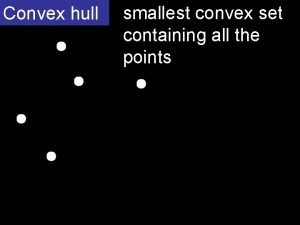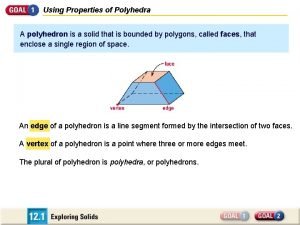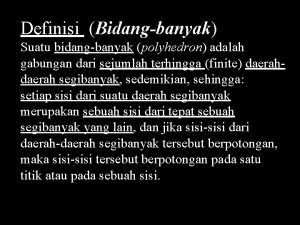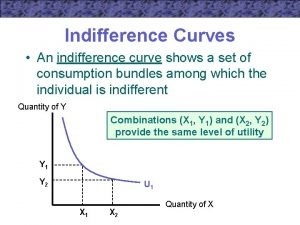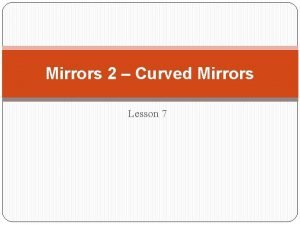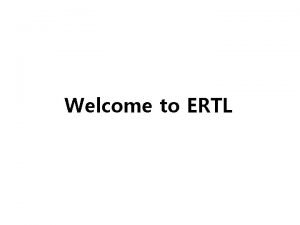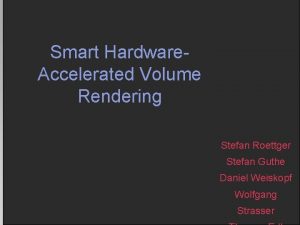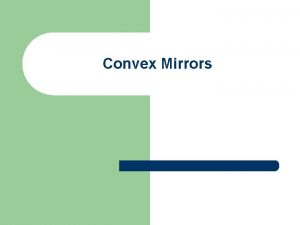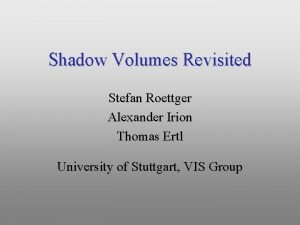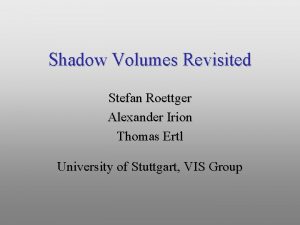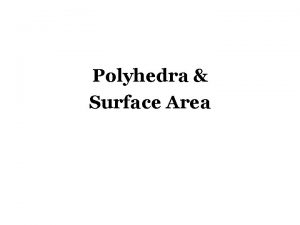CellProjection of Convex Polyhedra Stefan Roettger Thomas Ertl










- Slides: 10

Cell-Projection of Convex Polyhedra Stefan Roettger Thomas Ertl University of Erlangen

2 Introduction • Unstructured volume rendering • Cell-projection = PT algorithm of Shirley and Tuchman (’ 90) • Main bottlenecks: sorting and tetrahedral decomposition (Wittenbrink ‘ 99) • Current performance 600, 000 tet/s (Guthe ‘ 02) • Above 1, 000 tet/s performance is completely memory bandwidth limited Cell-Projection of Convex Polyhedra Stefan Roettger, University of Erlangen Volume Graphics ‘ 03 Tokyo

Emissive Optical Model • Use emissive optical model (Max ‘ 95) • Does not require sorting • Ray integral = length of ray segment times average emission (assuming linear interpolation) Cell-Projection of Convex Polyhedra Stefan Roettger, University of Erlangen Volume Graphics ‘ 03 Tokyo 3

Projection of Convex Polyhedra • The graphics hardware can take over the projection of arbitrary convex polyhedra • Based on bounded layered fog (Mech JGT ‘ 01) Cell-Projection of Convex Polyhedra Stefan Roettger, University of Erlangen Volume Graphics ‘ 03 Tokyo 4

5 PCP Algorithm • 1 st pass – enable A writing and front face culling – draw primitive with alpha=(d-min d)/ d • 2 nd pass – enable subtractive blending and back face culling – draw primitive again • 3 rd pass – disable A writing and culling – enable additive blending with alpha multiplied – draw primitive with rgb=emission/2 Cell-Projection of Convex Polyhedra Stefan Roettger, University of Erlangen Volume Graphics ‘ 03 Tokyo

6 Performance • Emissive model: 212, 000 hex/s on NVIDIA Ge. Force 3 (Guthe ‘ 02: 120, 000 hex/s) • For maximum intensity projection one only needs to render each face once • Performance is about 600, 000 hex/s • Performance drop is mainly due to additional passes Cell-Projection of Convex Polyhedra Stefan Roettger, University of Erlangen Volume Graphics ‘ 03 Tokyo

7 Example Images Bluntfin 8 fps Campfire 50 fps Neghip 22 fps Cell-Projection of Convex Polyhedra Stefan Roettger, University of Erlangen Volume Graphics ‘ 03 Tokyo

8 Ground Fog • Triangulated terrain • Place prism on every base triangle • Assume constant emission in each prism Cell-Projection of Convex Polyhedra Stefan Roettger, University of Erlangen Volume Graphics ‘ 03 Tokyo

9 Emission vs. MIP 25 fps Cell-Projection of Convex Polyhedra Stefan Roettger, University of Erlangen 50 fps Volume Graphics ‘ 03 Tokyo

10 Fin Thanks for your attention! Cell-Projection of Convex Polyhedra Stefan Roettger, University of Erlangen Volume Graphics ‘ 03 Tokyo
 Convex hull is the smallest convex set
Convex hull is the smallest convex set Convex polygon examples
Convex polygon examples Regular polyhedra
Regular polyhedra Properties of polyhedrons
Properties of polyhedrons Manakah yang merupakan polyhedron
Manakah yang merupakan polyhedron Amputation burgess
Amputation burgess Lisfrank amputasyonu
Lisfrank amputasyonu Natalie ertl
Natalie ertl Thomas mocker and thomas stewart
Thomas mocker and thomas stewart Perfect substitutes utility function
Perfect substitutes utility function Mirror that curves outward and use in convenience store
Mirror that curves outward and use in convenience store
